Category: Stories
Soozveen Catering
Startup Q&A: Soozveen Catering
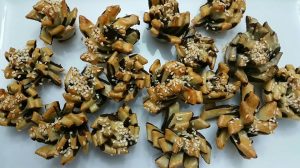 mother, and aunts cook all the time. From memorized family recipes, they cooked complicated dishes without measuring a thing, and even when they were exhausted. It was when our mother got sick that we started helping out more in the kitchen. We would cook so much food and then take it to Highline College, where we were working at the time - and still work.The staff and teachers would tell us we made so much food that we should just open a restaurant. Dean Alice Madsen was the first to seriously encourage us to think seriously about opening a business and connected us with classes and support.. We thought it was just going to be a side job and that it would not become anything real but before we knew it there were orders coming in and we were going through the process to formalize our business.
Q: What makes you different from other types of catering business?
We cook with love. Soozveen actually means ‘the promise of love’. We have a true passion for this work and care about everything from flavors to presentation. There are a lot of Mediterranean/Iraqi restaurants but we are one of only two Kurdish in King County. We are unique in our use of spices that we get from Northern Iraq – it’s really the taste of the land. Our specialty is our stuffed grape leaves (dolma) and baklava.
Q: What is your business’ biggest challenge?
mother, and aunts cook all the time. From memorized family recipes, they cooked complicated dishes without measuring a thing, and even when they were exhausted. It was when our mother got sick that we started helping out more in the kitchen. We would cook so much food and then take it to Highline College, where we were working at the time - and still work.The staff and teachers would tell us we made so much food that we should just open a restaurant. Dean Alice Madsen was the first to seriously encourage us to think seriously about opening a business and connected us with classes and support.. We thought it was just going to be a side job and that it would not become anything real but before we knew it there were orders coming in and we were going through the process to formalize our business.
Q: What makes you different from other types of catering business?
We cook with love. Soozveen actually means ‘the promise of love’. We have a true passion for this work and care about everything from flavors to presentation. There are a lot of Mediterranean/Iraqi restaurants but we are one of only two Kurdish in King County. We are unique in our use of spices that we get from Northern Iraq – it’s really the taste of the land. Our specialty is our stuffed grape leaves (dolma) and baklava.
Q: What is your business’ biggest challenge?
 Q: What types of services or programs have been helpful?
StartZone at Highline College has a lot of workshops around marketing, labelling, accounting. Project Feast helped us in nutrition and food safety. FIN has helped us to get our business license and permits and to connect us with more people – to help us build our network. Ventures provided training to help us understand how to plan and run a business.
Q: What would you say to other small food business owners thinking of working with FIN?
There are so many opportunities out there, you just have to believe in yourself. But at the same time, be prepared. There are a lot of logistics you need to learn – things will not happen right away and you need to take the time to be prepared and don’t react out of a sense of urgency. Believe in yourself and you must believe in any organization you are working with, the trust must be there when you are getting help from someone.
Q: What types of services or programs have been helpful?
StartZone at Highline College has a lot of workshops around marketing, labelling, accounting. Project Feast helped us in nutrition and food safety. FIN has helped us to get our business license and permits and to connect us with more people – to help us build our network. Ventures provided training to help us understand how to plan and run a business.
Q: What would you say to other small food business owners thinking of working with FIN?
There are so many opportunities out there, you just have to believe in yourself. But at the same time, be prepared. There are a lot of logistics you need to learn – things will not happen right away and you need to take the time to be prepared and don’t react out of a sense of urgency. Believe in yourself and you must believe in any organization you are working with, the trust must be there when you are getting help from someone.
FIN’s newest staff member shares views on cultural identity as an Iraqi-American.
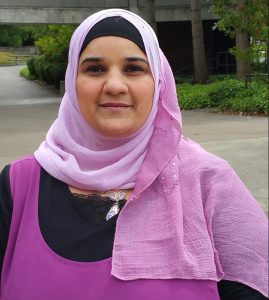
Sheelan Shamdeen, FIN Program Assistant
Sheelan Shamdeen, a Kurdish-Iraqi refugee, began working with FIN as a graduate of Project Feast’s Apprenticeship Program. Also a client of StartZone at Highline College, she and her sister found support in planning their own Iraqi catering company - Soozveen. But catering is only a small part of her story. In fact, Sheelan looks at their catering company as tool to bridge her two identities as a Kursdish-Iraqi refugee and an American citizen – food is a platform for dialogue she says. “We had 24 hours to leave and weren’t sure where we were going.” Sheelan and her family fled Iraq in 1996 when Saddam Hussein announced anyone associated with the UN would be publicly hanged. They, along with countless others, spent 3 nights under a tent with no passports - their only keepsake from home a teddy bear her sister had saved. Although they were safe once they reached Turkey, they had a long unknown journey ahead of them. Arriving in Guam, many families squeezed into tight living quarters for months while official paperwork was filed to enter the US with green cards. Twenty years later Sheelan, her mother, and seven siblings are all US citizens. Many of those years have been spent teaching English to other immigrants and refugees at Highline College. Although she remembers every detail of her life in Iraq, she also embraces American culture and encourages newcomers to do the same. “Many refugees feel this is only temporary – that this is not their home. But this is the place that helped my family survive and I believe I have two homes now.” To her, she is truly accepted in America as a human being - not a Muslim or an Iraqi but as a person. Despite the things sometimes said in media and politics, she feels like she belongs here. Sheelan doesn’t want any immigrant to lose their language or culture but believes it is important to also feel at home here. In America it is possible to celebrate both patriotism and cultural diversity in the same breath. Sharing Iraqi food with people is just one way that she can start conversations about cultural identity. Over two years have passed since Sheelan was first introduced to FIN. She was part of the first group of Community Food Advocates, recently joined the first cohort FIN Entrepreneurs and, in September 2016, took a staff position as FIN’s Program Assistant. Being a refugee means Sheelan knows what it feels like to start something from nothing. She brings compassion into her work and is quick to respond in a moment of need. All she asks of those around her is to be open minded.
Sheelan's advice to all people: “Ask questions before assuming you know someone’s story. Keep learning –there are so many free resources out there. And if you can’t find anything to learn then start a conversation with someone new.”
Over two years have passed since Sheelan was first introduced to FIN. She was part of the first group of Community Food Advocates, recently joined the first cohort FIN Entrepreneurs and, in September 2016, took a staff position as FIN’s Program Assistant. Being a refugee means Sheelan knows what it feels like to start something from nothing. She brings compassion into her work and is quick to respond in a moment of need. All she asks of those around her is to be open minded.
Sheelan's advice to all people: “Ask questions before assuming you know someone’s story. Keep learning –there are so many free resources out there. And if you can’t find anything to learn then start a conversation with someone new.”
by Allison Mountjoy January 9, 2017, 10:30AM PST
Jaqueline Garcia: Community Food Advocate
From Motherhood to Social Justice Activista
At 31, Jaqueline Garcia is a force of nature. From empowering Latina mothers to small business advisor, it is motherhood that really fueled her ambition. Jaqueline left Mexico and a burgeoning dentistry practice when she and her husband moved to San Francisco. Intending to continue dentistry in the States, a different course began to unfold when they moved to Seattle and Jaqueline became pregnant. Although happy, she was very far away from her support system. Jaqueline explains: “this was a moment that I felt very isolated from family and depressed.” That moment was also the catalyst for her to become a community leader. (more…)Cesar Amaral, MX180 Nutrition
One of the most frightening things Cesar Amaral has ever done was to become an entrepreneur. As an entrepreneur, he says, you must take responsibility for everything. You become the deliveryman, the marketing guru, and the business developer. But if you can plan, re-evaluate, and be persistent it will all pay off. It begins with taking responsibility and most of all, pushing yourself.
Cesar’s mother passed away from diabetes in 2012 and, to him, it was a wake-up call that changed his life. Although he had built a successful career in banking he wasn’t fulfilled; he was 275lbs and wanted to turn his life around. He started simple, walking 30 minutes a day and eating small meals every three hours. As he began to improve his own health, Cesar looked to the Latino community and found alarming rates of diabetes and obesity and very few role models for health and nutrition. In taking control of his own life, it became his mission to become a role model in the Latino community and fight the diabetes and obesity epidemics.
By 2014, he had left his job in banking and become certified as a personal trainer. He was producing workout videos and holding group workout classes in Spanish in an effort to get other Latinos more active. But obesity trends were still slowly rising and he started to shift his focus to nutrition as well as exercise. After much research he developed MX180, a weight management and nutrition program for people who are overweight or obese and need to improve their health. MX180 focuses on personalized nutrition plans with Mexican style meal options, virtual personal training, and a specially developed MX180 protein shake. With the launch of MX180, Cesar has become a community leader, often speaking at schools about nutrition and healthy; he truly helps people turn their lives around 180 degrees.
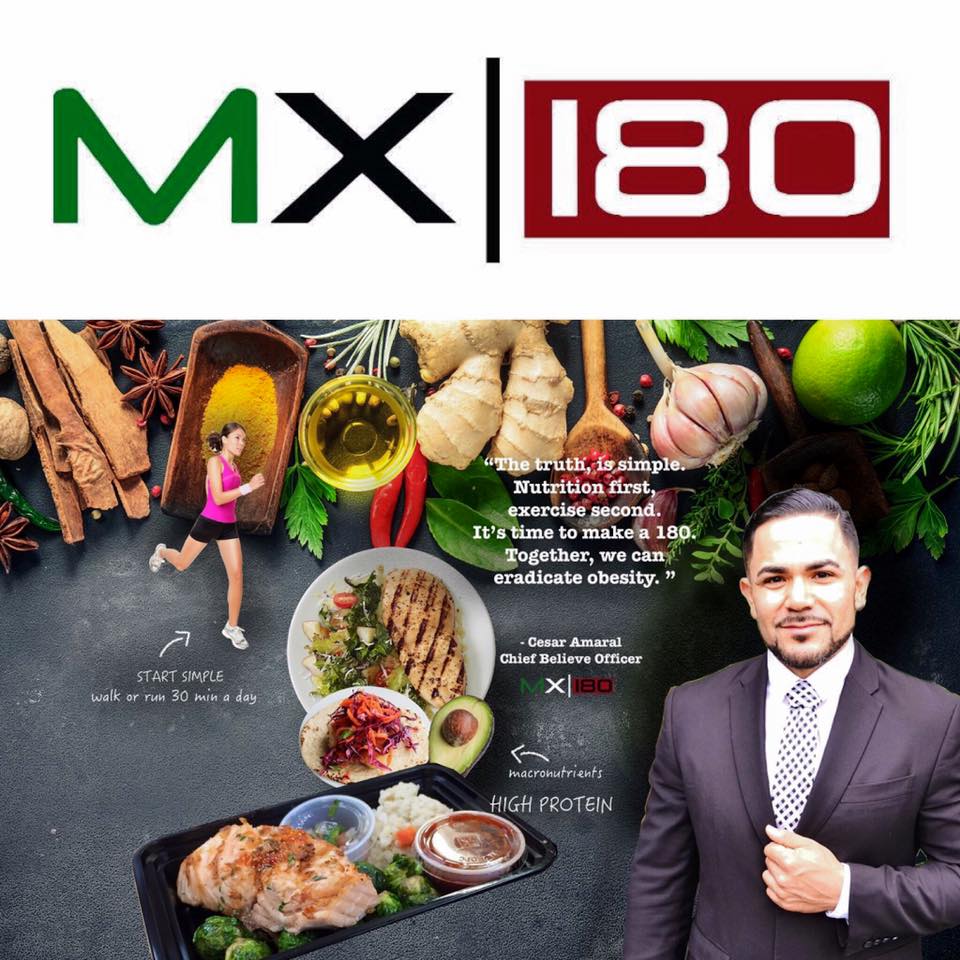 What advice does Cesar offer other entrepreneurs?
“Always connect to like-minded people. A majority of the world will tell you you’re not going to make it so it’s important to believe in yourself because the euphoria wears off. When you start something it’s so new and you’re so determined, but what will you do a few months from now when you are tired and run-down? During the dark moments you really need to dig in, get out of bed, and find people who will help keep you motivated.”
“Dig in, believe in yourself, and go for it.”
What advice does Cesar offer other entrepreneurs?
“Always connect to like-minded people. A majority of the world will tell you you’re not going to make it so it’s important to believe in yourself because the euphoria wears off. When you start something it’s so new and you’re so determined, but what will you do a few months from now when you are tired and run-down? During the dark moments you really need to dig in, get out of bed, and find people who will help keep you motivated.”
“Dig in, believe in yourself, and go for it.”
 If you're ready to take control of your life by forming new healthy habits, try the MX180 30-Day Plan. For more details call (206) 853-9847.
Check out the MX180 website and connect with them on Facebook and Instagram.
If you're ready to take control of your life by forming new healthy habits, try the MX180 30-Day Plan. For more details call (206) 853-9847.
Check out the MX180 website and connect with them on Facebook and Instagram.
Elaine Brand, In Your Face Pie Company
In Your Face Pie Company owner Elaine grew up in the Bronx, New York with her artist minded family. Her father made wooden toys that functionally disabled adults would sand, paint, and sell. Elaine watched her father, knowing one day she too would give back to her community.
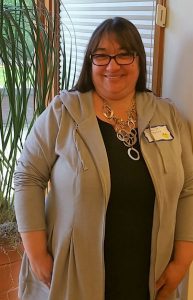 Years later, after her husband's job offer in Seattle fell through, she felt dangerously close to not being able to provide for her daughter. Before moving to Seattle Elaine had earned undergraduate degrees in Acting & Directing, Technical Theatre, and a Master’s degree in Performing Arts Management. Upon leaving NYC, it became difficult to find work as many employers felt she was overqualified for the positions available. “No one wanted to hire me. I had a child at the time and I just needed a job.” Although her husband eventually found a new job and supported them, she wanted to make something of herself. Elaine's father was the first to suggest that she begin a career in baking.
Elaine fell in love with the idea and immediately enrolled in baking courses, eventually earning a certificate in Pastry and Specialty baking and learning the operations skills necessary to run food catering business. She quickly opened a chocolate company and eventually a small catering company. Eventually she closed the doors on both businesses and focused on raising her two daughters until they graduated high school. Though her passion for owning food businesses never faltered.
Years later, after her husband's job offer in Seattle fell through, she felt dangerously close to not being able to provide for her daughter. Before moving to Seattle Elaine had earned undergraduate degrees in Acting & Directing, Technical Theatre, and a Master’s degree in Performing Arts Management. Upon leaving NYC, it became difficult to find work as many employers felt she was overqualified for the positions available. “No one wanted to hire me. I had a child at the time and I just needed a job.” Although her husband eventually found a new job and supported them, she wanted to make something of herself. Elaine's father was the first to suggest that she begin a career in baking.
Elaine fell in love with the idea and immediately enrolled in baking courses, eventually earning a certificate in Pastry and Specialty baking and learning the operations skills necessary to run food catering business. She quickly opened a chocolate company and eventually a small catering company. Eventually she closed the doors on both businesses and focused on raising her two daughters until they graduated high school. Though her passion for owning food businesses never faltered.
 Inspired by her father's philanthropic heart and her daughter's career in the Marines, Elaine began dreaming of a pie company. She set out to start a pie cafe where anyone who walked in the door would feel at home. In addition to her pies she would also provide employment and assistance to retired veterans.
To start this new journey, Elaine enrolled in courses at Start Zone which led her to make connections with the Food Innovation Network and later Ventures. Through being tenacious and hardworking she graduated from Ventures’ Business Development Training program, received both her LLC and business license, and is working on developing the catering side of her business. Her company features over 40 varieties of sweet and 18 varieties of savory pies.
What advice does Elaine have for other budding entrepreneurs? “Learn everything you can about your business and be a champion for your business. You have to want it, you have to want so bad that you can taste it. And I can really taste it.”
Inspired by her father's philanthropic heart and her daughter's career in the Marines, Elaine began dreaming of a pie company. She set out to start a pie cafe where anyone who walked in the door would feel at home. In addition to her pies she would also provide employment and assistance to retired veterans.
To start this new journey, Elaine enrolled in courses at Start Zone which led her to make connections with the Food Innovation Network and later Ventures. Through being tenacious and hardworking she graduated from Ventures’ Business Development Training program, received both her LLC and business license, and is working on developing the catering side of her business. Her company features over 40 varieties of sweet and 18 varieties of savory pies.
What advice does Elaine have for other budding entrepreneurs? “Learn everything you can about your business and be a champion for your business. You have to want it, you have to want so bad that you can taste it. And I can really taste it.”
Dieynaba Kouyate, Saran African Market
SeaTac business owner, Dieynaba, opened Saran African Market in 2010 in honor of her mother, Saran, who owned and operated a food wholesale and distribution business in Côte d’Ivoire. Dieynaba’s own journey began when she immigrated to the US in 2002, following the passing of both of her parents, with the goal provide financial support for her family back home. Her arrival to the US, however, was met with several drawbacks, one of them being her departure from university where she was studying math, physics, and chemistry. Instead of the promising land of opportunity, Dieynaba was met with a confusing immigration system and highly competitive job market. Language barriers, inability to continue school with her visa, and the high cost of living made it difficult to send money home.
Dieynaba found herself braiding hair to make ends meet, while she worked toward her entry into the US job market. Within that time she began to build a reputation for herself within the West African community and within Dieynaba noticed a vital need for more access to African goods within the community. By gathering community feedback she was able to open a shop that caters to her community's needs and showcases the cultural resources of many African communities. Saran African market carries goods that are otherwise hard for her community to find including food, personal products, clothing, and a hair braiding salon in the back.
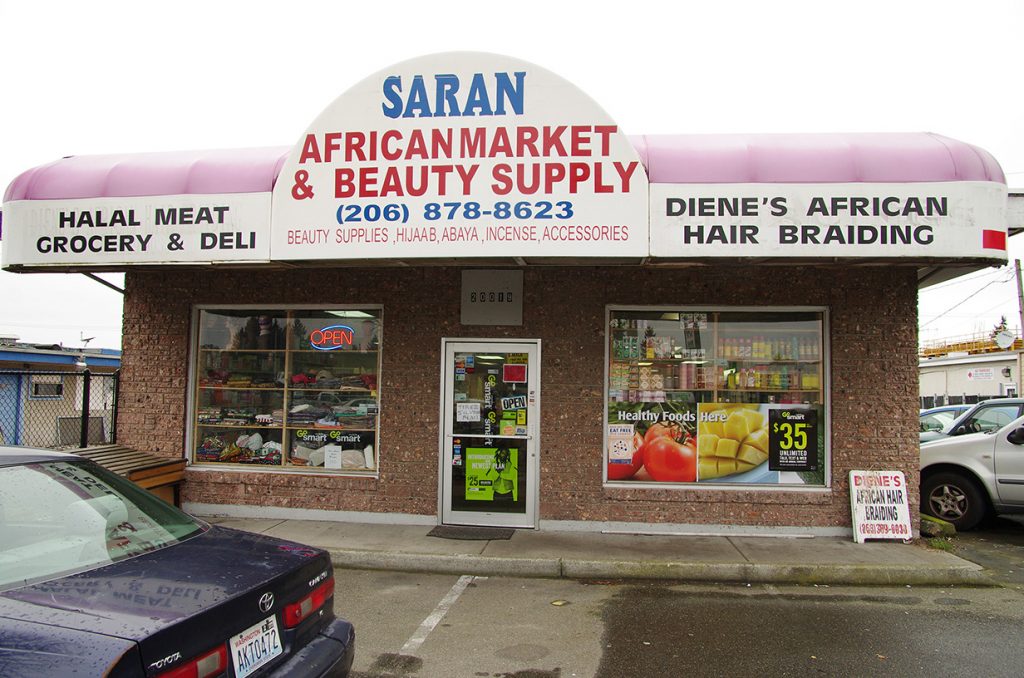 For the past five years her shop has grown in its success and popularity but with the introduction of the new light rail station, and rising costs of rent, the future of Dieynaba's business is filled with rising uncertainty. The 200th Street light rail station, less than a block away and scheduled to open late 2016, has come with the promise of increased store traffic and sales. Over a year of construction though, has brought only a crammed parking lot, off-putting noise from construction, and so much dust that Dieynaba has had to close her back-of-store salon.
Keeping stock of her most popular items, like smoked catfish and cassava products, helps the community stick with her during construction. She hopes these same products will bring in new customers from the station; some happy to find a reminder of back home and others seeking to experience the diversity of SeaTac. If the light rail station is able to deliver on such promises, Dieynaba will be able to take the next step in her business. While much of her food products are imported, Dieynaba dreams of a future where she owns a piece of land to grow and process some of these items locally.
[gallery link="file" ids="519,520,521,522,523,524,525,526,527"]
What advice does Dieynaba have for other budding entrepreneurs? “Save money and plan ahead. It’s good to have at least six months to a year’s worth of savings before opening a business, also take workshops in bookkeeping and cash flow as you’ll find them to be helpful with your business.”
For the past five years her shop has grown in its success and popularity but with the introduction of the new light rail station, and rising costs of rent, the future of Dieynaba's business is filled with rising uncertainty. The 200th Street light rail station, less than a block away and scheduled to open late 2016, has come with the promise of increased store traffic and sales. Over a year of construction though, has brought only a crammed parking lot, off-putting noise from construction, and so much dust that Dieynaba has had to close her back-of-store salon.
Keeping stock of her most popular items, like smoked catfish and cassava products, helps the community stick with her during construction. She hopes these same products will bring in new customers from the station; some happy to find a reminder of back home and others seeking to experience the diversity of SeaTac. If the light rail station is able to deliver on such promises, Dieynaba will be able to take the next step in her business. While much of her food products are imported, Dieynaba dreams of a future where she owns a piece of land to grow and process some of these items locally.
[gallery link="file" ids="519,520,521,522,523,524,525,526,527"]
What advice does Dieynaba have for other budding entrepreneurs? “Save money and plan ahead. It’s good to have at least six months to a year’s worth of savings before opening a business, also take workshops in bookkeeping and cash flow as you’ll find them to be helpful with your business.”
Floribert Mubalama, Community Food Advocate and Congolese Refugee
One of the highlights of FIN's 2015 Celebration was a presentation on refugee experiences. Floribert walked through the physical, psychological, and emotional impact of the Congo's last 20 years of war and the jarring loss of identity felt in the refugee camps. To him, this is a death and the transition to life in the US is like being reborn. Although transformative, arrival is also met with a loss of culture, lack of familiar foods, and a healthcare and social system that seems impossible to navigate. After spending only 1 year in the United States, Floribert is a leader in his local community. He currently works full time, attends school, participates as a Community Food Advocate, and in 2016 will begin co-chairing a FIN working group. What drives him? Floribert speaks of simple solutions to aid in integration and prioritizing supports for refugees to become successful citizens of the US.
